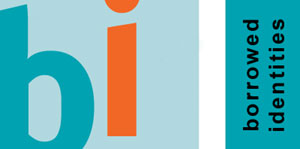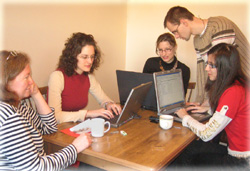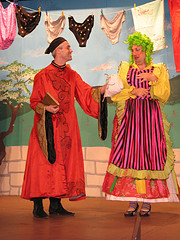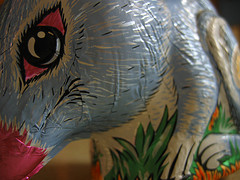
absolutely philosophical?
In show 57 we talked about how teamwork in internationally mixed groups is influenced by different cultural habits. In this show, we put the emphasis on how the work itself can be different and we hear, that often for people from Southern Europe the result is not the most important concern, but that the way how the result should be achieved needs more attention and discussion. Sometimes, in the eyes of the Northerners this can lead to seemingly endless “philosophical” discussions with uncertain outcome. For Germans, this often seems as if “they just like to talk and talk a lot”, because the function (e.g. trust-building) of this kind of communication is not so obvious. However, our interviewees also recognize, that all different ways are “kind of right” and that you just have to learn how to handle different styles so that in the end you can work successfully in all international environments.
absolutely quiet:
Petros is an exchange student from Greece, the country of the ancient philosophers. He is now in Germany for his semester abroad and you could get the impression that he somehow enjoyed that there was not so much talking in public places and generally more discipline. Leaving the strike-ridden university system in Greece he stresses that he likes that German students are very quiet in the library and also very reliable when it comes to group work or presentations. It seems that Petros can confirm most of the stereotypes people around the world have about the Germans, that most of them are disciplined, reliable and punctual. He also tells us that he first had problems with “proxemics”, the attitude to personal space, distance and touching each other during a conversation, but that he learned a lot for his future in international work places.
absolutely royal:
We speak to Georg Reifferscheid, a student at RheinAhrCampus, who recently made a real king from Africa visit our campus and hold a panel discussion with students about development aid. Herr Meickl is an architect from Germany, who was made king by a Ghanaian village, because he had invested so much of his time and energy in his development projects there. Mr. Meickl showed the students the difference between development and financial aid and also presented a video of his “crowning ceremony” in Ghana. Georg shares his initial worries and experiences with us telling us how this unique opportunity came up and what he learned on the event management side.
absolutely improved:
In our last category we talk to Maria Koenen, teaching assistant on a Business English course, about various opportunities to improve your language skills. She tries to motivate her students not only to learn during the course, but to combine your hobbies with learning English at home or even on your way to work or to university. The result is, that all students now try out different things to improve their English outside the classroom
So long…stay tuned!
The host of this show is: Dr. Laurent Borgmann
Editor: Peter Kron
The next show will be coming to you on 27 June from Anne Fox in Denmark.

 absolutely student-centred
absolutely student-centred Absolutely Educational The main part of this show is devoted to the impressions of two of the teachers who facilitated workshops as part of the ‘Borrowed Identities’ project which brought over 30 students together from Hungary, Germany, the UK, Spain and Lithuania on the west coast island of Achill in Ireland. How did the teachers manage these multi-cultural groups? Were there language problems? Listen as Scott de Francesco from the USA and Dainora Maumevičienė from Lithuania describe the progress of the groups as the week wears on. You can find out more about the project and what went on by reading the
Absolutely Educational The main part of this show is devoted to the impressions of two of the teachers who facilitated workshops as part of the ‘Borrowed Identities’ project which brought over 30 students together from Hungary, Germany, the UK, Spain and Lithuania on the west coast island of Achill in Ireland. How did the teachers manage these multi-cultural groups? Were there language problems? Listen as Scott de Francesco from the USA and Dainora Maumevičienė from Lithuania describe the progress of the groups as the week wears on. You can find out more about the project and what went on by reading the 





